通用版小升初英语语法突破荟萃集训专题七 代词课件(共25张PPT)
文档属性
| 名称 | 通用版小升初英语语法突破荟萃集训专题七 代词课件(共25张PPT) |  | |
| 格式 | zip | ||
| 文件大小 | 760.2KB | ||
| 资源类型 | 试卷 | ||
| 版本资源 | 通用版 | ||
| 科目 | 英语 | ||
| 更新时间 | 2022-06-08 08:50:11 | ||
图片预览

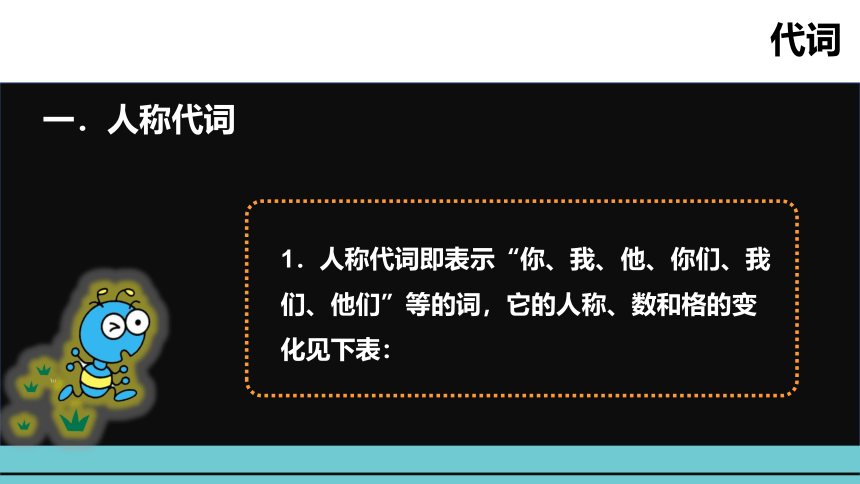

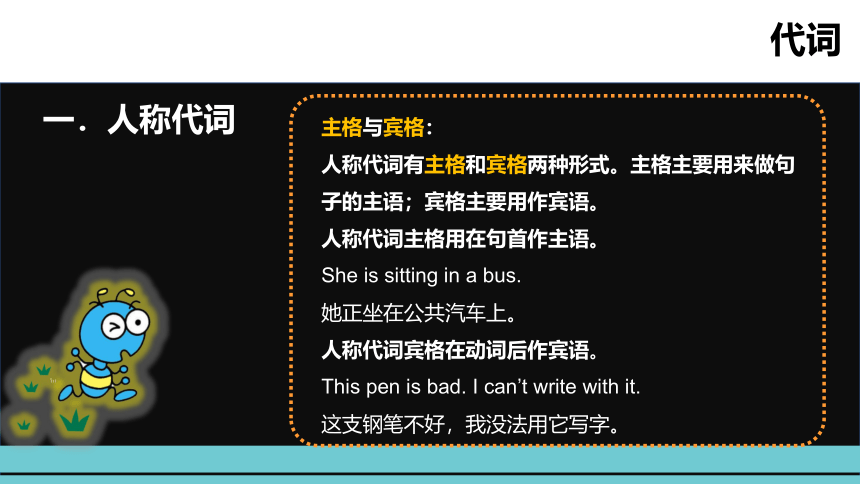
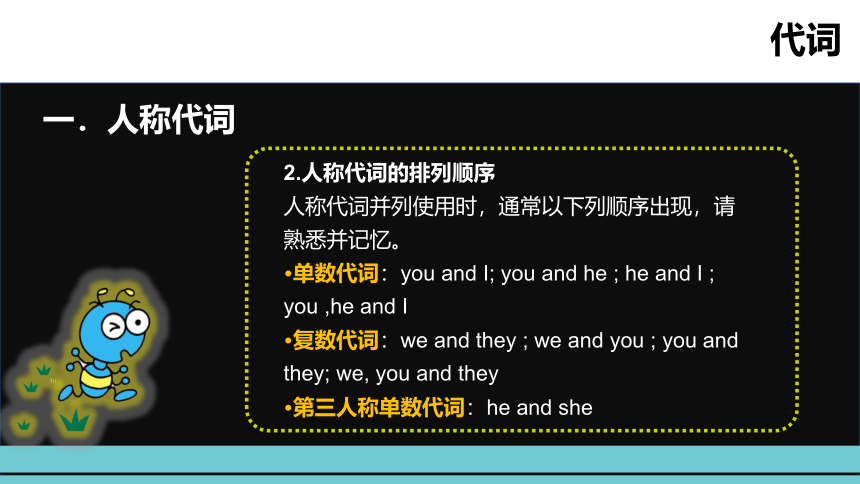
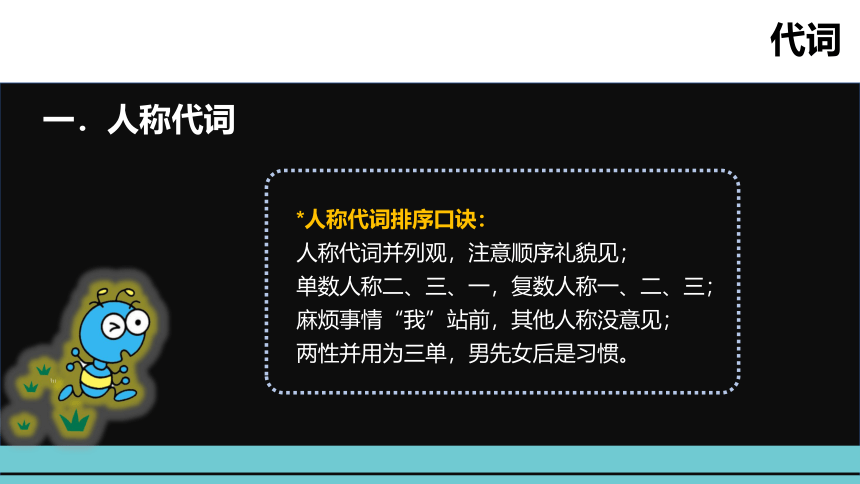

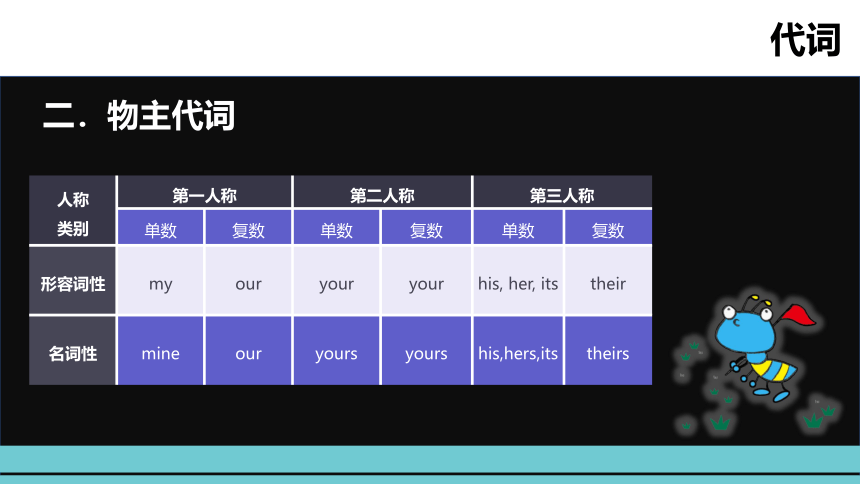

文档简介
(共25张PPT)
小学语法全集
专题七 代词
代词分为人称代词、物主代词、反身代词、指示代词、不定代词等
代词
一.人称代词
1.人称代词即表示“你、我、他、你们、我们、他们”等的词,它的人称、数和格的变化见下表:
代词
一.人称代词
数 人称 主格 宾格
单数 第一人称 I me
第二人称 you you
第三人称 he she it him
her
it
复数 第一人称 We us
第二人称 you you
第三人称 they them
代词
一.人称代词
主格与宾格:
人称代词有主格和宾格两种形式。主格主要用来做句子的主语;宾格主要用作宾语。
人称代词主格用在句首作主语。
She is sitting in a bus.
她正坐在公共汽车上。
人称代词宾格在动词后作宾语。
This pen is bad. I can’t write with it.
这支钢笔不好,我没法用它写字。
代词
一.人称代词
2.人称代词的排列顺序
人称代词并列使用时,通常以下列顺序出现,请熟悉并记忆。
单数代词:you and I; you and he ; he and I ; you ,he and I
复数代词:we and they ; we and you ; you and they; we, you and they
第三人称单数代词:he and she
代词
一.人称代词
*人称代词排序口诀:
人称代词并列观,注意顺序礼貌见;
单数人称二、三、一,复数人称一、二、三;
麻烦事情“我”站前,其他人称没意见;
两性并用为三单,男先女后是习惯。
二.物主代词
物主代词是表示所有关系的代词,分为形容词性物主代词和名词性物主代词。
代词
二.物主代词
代词
人称 类别 第一人称 第二人称 第三人称
单数 复数 单数 复数 单数 复数
形容词性 my our your your his, her, its their
名词性 mine our yours yours his,hers,its theirs
二.物主代词
名词性物主代词 = 形容词性物主代词 + 名词
例如:Whose coat is this 这是谁的上衣
It’s hers. 是她的。 hers= her coat
代词
二.物主代词
*关于物主代词的口诀
物主代词很重要,译成汉语都有“的”,
后面必须加上物,否则就要犯错误,
my your his her its our their 不放过。
形容词性是基础,除了我的 “mine”外,其他词尾“s”
形物代词能力差,出门常把名词加;
名物代能力强,常来独去又独往。
代词
二.物主代词
*关于物主代词的口诀
物主代词很重要,译成汉语都有“的”,
后面必须加上物,否则就要犯错误,
my your his her its our their 不放过。
形容词性是基础,除了我的 “mine”外,其他词尾“s”
形物代词能力差,出门常把名词加;
名物代能力强,常来独去又独往。
代词
三.反身代词
反身代词也叫“自身代词”,表示“**自己”。
代词
数 人称 第一人称 第二人称 第三人称
单数 myself yourself himself, herself
复数 ourselves yourselves themselves
三.反身代词
反身代词也叫“自身代词”,表示“**自己”。
代词
数 人称 第一人称 第二人称 第三人称
单数 myself yourself himself, herself
复数 ourselves yourselves themselves
I can do it by myself. 我自己能做这件事。
三.反身代词
*反身代词的构成规律记忆口诀:
反身代词有规律,
第三人称宾格加,
其余开头用物主,
复数-ves替-f
代词
四.指示代词
代词
This (这个)------- these (这些) 指近处的事物
That (那个)------- these (那些) 指远处的事物
例如:This is a book. 这是本书。
These are some books. 这些是书。
That is a car. 那是辆小汽车。
Those are some cars. 那些是小汽车。
五.不定代词
代词
常用不定代词有:
some(something,somebody,someone),
any(anything,anybody,anyone),
no(nothing,nobody,no one),
every(everything,everybody,everyone),
all,each,both,much,many,
(a)little,(a)few,other(s),another,
none,one,either, neither等。
一般来讲,修饰不定代词的词要置于其后。
五.不定代词
代词
1.不定代词的用法
不定代词大都可以代替名词和形容词,在句中作主语、宾语和定语。
1)作主语
Both of them are teachers.他们两人都是教师。
2)作宾语
I know nothing about this person.我对这个人一无所知。
3)作定语
There is a little water in the glass.玻璃杯里有一些水。
五.不定代词
代词
2.some(something,somebody,someone)和any(anything,anybody,anyone)的区别
some(something,somebody,someone)和any(anything,anybody,anyone)都有“某人/物/事”的意思,一般情况some用在肯定句中,而any用在疑问句或否定句中。
Did you hear anything 你听到什么了吗?
Yes, I heard something. 对,我听到了。
Did you see anyone in the shop 你在商店看到有人吗?
I didn’t say anything. 我什么也没说。
Someone has taken your umbrella. 有人拿走了你的伞。
五.不定代词
代词
2.some(something,somebody,someone)和any(anything,anybody,anyone)的区别
但是,有一种特殊情况需注意,some(something,somebody,someone)可用于表示征求意见的问句中。
Would you like something to drink 你要喝点什么吗?
Do you want some milk 你要牛奶吗?
五.不定代词
代词
2.some(something,somebody,someone)和any(anything,anybody,anyone)的区别
另外anything有 两种意思1,一些事 2,任何事
当它是第一个意思的时候,通常用于在否定以及疑问句中替代something,因为something一般用于肯定句中。
第二个意思很好理解,它强调的是任何事,任何个体。
一个有名的广告语,
Anything is possible. 一切都有可能。
I think I can do anything for you. 为了你,我愿意做任何事。
专项练习---
https:///413365327/spell
代词
课堂测试---
https:///259902399/test
代词
阅读
二.阅读理解
Students in many countries are learning English. Some of these students are small children. Others are teenagers(少年). Many are adults. Some learn at school, others by themselves. A few learn English by hearing the language over the radio, on TV, or in films. One must work hard to learn another language.
Why do all these people want to learn English It is difficult to answer this question. Many boys and girls learn English at school because it is one of their subjects required(要求) for study. They study their own language. Maths and English. Some people learn it because it is useful for their work. Many people learn English for their higher studies, because they want to go to college or university(大学). Some of their books are written in English. Other people learn English because they want to read newspapers and magazines in English.
可数名词与不可数名词
阅读
( ) 1. People learn English ________.
A. at school B. over the radio
C. on TV D. not all in the same way
( ) 2. It is ________ to answer why so many people want to learn English.
A. hard B. easy C. pleased D. angry
( ) 3. Different kinds of people want to learn English __________.
A. together with other B. for different reasons subjects
C. for their work D. for higher studies at colleges
( ) 4. From this passage we know that _____________.
A. we can learn English easily B. English is very difficult to learn
C. English is learned by most people in the world
D. English is a useful language but one must work hard to learn it
( ) 5. From this passage we know that ___________.
A. We don't need to learn any foreign language
B. We can do well in all work without English
C. English is the most important subject in schools
D. We should learn English because we need to face the world.
可数名词与不可数名词
D
A
B
D
D
小学语法全集
专题七 代词
小学语法全集
专题七 代词
代词分为人称代词、物主代词、反身代词、指示代词、不定代词等
代词
一.人称代词
1.人称代词即表示“你、我、他、你们、我们、他们”等的词,它的人称、数和格的变化见下表:
代词
一.人称代词
数 人称 主格 宾格
单数 第一人称 I me
第二人称 you you
第三人称 he she it him
her
it
复数 第一人称 We us
第二人称 you you
第三人称 they them
代词
一.人称代词
主格与宾格:
人称代词有主格和宾格两种形式。主格主要用来做句子的主语;宾格主要用作宾语。
人称代词主格用在句首作主语。
She is sitting in a bus.
她正坐在公共汽车上。
人称代词宾格在动词后作宾语。
This pen is bad. I can’t write with it.
这支钢笔不好,我没法用它写字。
代词
一.人称代词
2.人称代词的排列顺序
人称代词并列使用时,通常以下列顺序出现,请熟悉并记忆。
单数代词:you and I; you and he ; he and I ; you ,he and I
复数代词:we and they ; we and you ; you and they; we, you and they
第三人称单数代词:he and she
代词
一.人称代词
*人称代词排序口诀:
人称代词并列观,注意顺序礼貌见;
单数人称二、三、一,复数人称一、二、三;
麻烦事情“我”站前,其他人称没意见;
两性并用为三单,男先女后是习惯。
二.物主代词
物主代词是表示所有关系的代词,分为形容词性物主代词和名词性物主代词。
代词
二.物主代词
代词
人称 类别 第一人称 第二人称 第三人称
单数 复数 单数 复数 单数 复数
形容词性 my our your your his, her, its their
名词性 mine our yours yours his,hers,its theirs
二.物主代词
名词性物主代词 = 形容词性物主代词 + 名词
例如:Whose coat is this 这是谁的上衣
It’s hers. 是她的。 hers= her coat
代词
二.物主代词
*关于物主代词的口诀
物主代词很重要,译成汉语都有“的”,
后面必须加上物,否则就要犯错误,
my your his her its our their 不放过。
形容词性是基础,除了我的 “mine”外,其他词尾“s”
形物代词能力差,出门常把名词加;
名物代能力强,常来独去又独往。
代词
二.物主代词
*关于物主代词的口诀
物主代词很重要,译成汉语都有“的”,
后面必须加上物,否则就要犯错误,
my your his her its our their 不放过。
形容词性是基础,除了我的 “mine”外,其他词尾“s”
形物代词能力差,出门常把名词加;
名物代能力强,常来独去又独往。
代词
三.反身代词
反身代词也叫“自身代词”,表示“**自己”。
代词
数 人称 第一人称 第二人称 第三人称
单数 myself yourself himself, herself
复数 ourselves yourselves themselves
三.反身代词
反身代词也叫“自身代词”,表示“**自己”。
代词
数 人称 第一人称 第二人称 第三人称
单数 myself yourself himself, herself
复数 ourselves yourselves themselves
I can do it by myself. 我自己能做这件事。
三.反身代词
*反身代词的构成规律记忆口诀:
反身代词有规律,
第三人称宾格加,
其余开头用物主,
复数-ves替-f
代词
四.指示代词
代词
This (这个)------- these (这些) 指近处的事物
That (那个)------- these (那些) 指远处的事物
例如:This is a book. 这是本书。
These are some books. 这些是书。
That is a car. 那是辆小汽车。
Those are some cars. 那些是小汽车。
五.不定代词
代词
常用不定代词有:
some(something,somebody,someone),
any(anything,anybody,anyone),
no(nothing,nobody,no one),
every(everything,everybody,everyone),
all,each,both,much,many,
(a)little,(a)few,other(s),another,
none,one,either, neither等。
一般来讲,修饰不定代词的词要置于其后。
五.不定代词
代词
1.不定代词的用法
不定代词大都可以代替名词和形容词,在句中作主语、宾语和定语。
1)作主语
Both of them are teachers.他们两人都是教师。
2)作宾语
I know nothing about this person.我对这个人一无所知。
3)作定语
There is a little water in the glass.玻璃杯里有一些水。
五.不定代词
代词
2.some(something,somebody,someone)和any(anything,anybody,anyone)的区别
some(something,somebody,someone)和any(anything,anybody,anyone)都有“某人/物/事”的意思,一般情况some用在肯定句中,而any用在疑问句或否定句中。
Did you hear anything 你听到什么了吗?
Yes, I heard something. 对,我听到了。
Did you see anyone in the shop 你在商店看到有人吗?
I didn’t say anything. 我什么也没说。
Someone has taken your umbrella. 有人拿走了你的伞。
五.不定代词
代词
2.some(something,somebody,someone)和any(anything,anybody,anyone)的区别
但是,有一种特殊情况需注意,some(something,somebody,someone)可用于表示征求意见的问句中。
Would you like something to drink 你要喝点什么吗?
Do you want some milk 你要牛奶吗?
五.不定代词
代词
2.some(something,somebody,someone)和any(anything,anybody,anyone)的区别
另外anything有 两种意思1,一些事 2,任何事
当它是第一个意思的时候,通常用于在否定以及疑问句中替代something,因为something一般用于肯定句中。
第二个意思很好理解,它强调的是任何事,任何个体。
一个有名的广告语,
Anything is possible. 一切都有可能。
I think I can do anything for you. 为了你,我愿意做任何事。
专项练习---
https:///413365327/spell
代词
课堂测试---
https:///259902399/test
代词
阅读
二.阅读理解
Students in many countries are learning English. Some of these students are small children. Others are teenagers(少年). Many are adults. Some learn at school, others by themselves. A few learn English by hearing the language over the radio, on TV, or in films. One must work hard to learn another language.
Why do all these people want to learn English It is difficult to answer this question. Many boys and girls learn English at school because it is one of their subjects required(要求) for study. They study their own language. Maths and English. Some people learn it because it is useful for their work. Many people learn English for their higher studies, because they want to go to college or university(大学). Some of their books are written in English. Other people learn English because they want to read newspapers and magazines in English.
可数名词与不可数名词
阅读
( ) 1. People learn English ________.
A. at school B. over the radio
C. on TV D. not all in the same way
( ) 2. It is ________ to answer why so many people want to learn English.
A. hard B. easy C. pleased D. angry
( ) 3. Different kinds of people want to learn English __________.
A. together with other B. for different reasons subjects
C. for their work D. for higher studies at colleges
( ) 4. From this passage we know that _____________.
A. we can learn English easily B. English is very difficult to learn
C. English is learned by most people in the world
D. English is a useful language but one must work hard to learn it
( ) 5. From this passage we know that ___________.
A. We don't need to learn any foreign language
B. We can do well in all work without English
C. English is the most important subject in schools
D. We should learn English because we need to face the world.
可数名词与不可数名词
D
A
B
D
D
小学语法全集
专题七 代词
